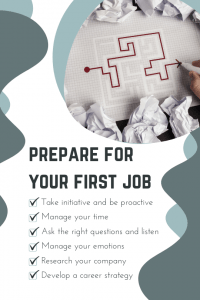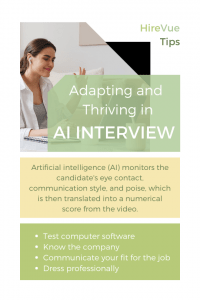By Communication Consultant Xinyi Cui (Accounting and BIS, ’22)
 As a senior, I always ask the interviewer one question: “What are your expectations for new hires?” Some interviewers really love this type of question and they are happy to share advice with students to help them perform well when they start their jobs. Do you also have this question and are nervous about starting your full-time job? Here are some tips for preparing yourself for a full-time job!
As a senior, I always ask the interviewer one question: “What are your expectations for new hires?” Some interviewers really love this type of question and they are happy to share advice with students to help them perform well when they start their jobs. Do you also have this question and are nervous about starting your full-time job? Here are some tips for preparing yourself for a full-time job!
Take initiative and be proactive
Companies love new hires because students that just graduated from college bring “new blood” and fresh ideas into the workplace. To meet this expectation, it is important to understand problems quickly and then suggest new approaches. Do not hesitate when you have new ideas because good supervisors appreciate employees’ assertiveness. However, it is important to make sure your thoughts are organized and easy to understand from the audience’s point of view. It is also suggested to take on additional responsibilities when you are not currently assigned any tasks. This action can show your desire to own responsibilities and learn new things. Try to avoid a logic trap of “this is not my job.”
Manage your time
Your working environment may be fast paced and overwhelming, so excellent time management skills are a necessity. Here are some helpful reminders:
- Use sticky notes or apps to organize your tasks before starting the day.
- Finish small tasks as soon as possible and use brief portions of time wisely, like responding to client emails in a timely manner.
- Do not panic when you have multiple tasks – prioritize them and finish each one by one.
- Never hesitate to ask for help from colleagues or supervisors; your team is there to support you.
Ask the right questions and listen
There are some common questions you need to ask in a company orientation or before you start your job. The answers to these questions help you better understand the workflow and avoid unproductive efforts in advance. These questions can also leave a good impression with your coworkers as you demonstrate your ambition to improve upon your predecessors.
- How can I best use my time here?
- Who should I reach out to for questions and concerns?
- Are there any common mistakes that I should avoid? What mistakes did previous employees make?
- Where can I improve?
- When you were in this position, what did you learn?
Manage your emotions
It is natural to feel nervous, excited, anxious, or tense when first entering the workplace because we all want to outperform in our first job and avoid any embarrassing mistakes. However, these tendencies can lead to panic and perfectionism, whereas Murphy’s law states, “anything that can go wrong, will go wrong.” Strong emotions do tend to increase the probability of mistakes. You may feel that you are at center stage, but this is an illusion – where, in fact, others are worried about their own tasks and deadlines. So it’s better to take a deep breath and relax. There are some good practices you can use to manage your emotions, like meditation, yoga and regular exercise. Stay calm and always remember that mistakes are perfect learning opportunities!
Research your company
Although you are not expected to know everything about the company before your start date, it doesn’t hurt to do research on the work environment. Some possible research topics are dress code, company structure, and so forth. Resources can be found on your company’s website, blog posts, press releases, social media platforms, and most importantly from current or previous employees and interns. Lehigh has a large alumni network so you should never hesitate to contact alumni who are working or have worked at your company – they would love to help!
Develop a career strategy
Just like your business college curriculum, it is suggested to develop a career roadmap when starting your first job. You can ask for advice from your mentors or other employees in the company, and then plan your future with the following questions:
- What is your five year goal?
- Where do you want to be at this time next year?
- How can you accomplish your short-term goal in the following months?
- What are some actions you can take or avoid?
- How can you build up your network? What kind of social events can you attend?
- Have you met your goals and accomplished your plans?
An appropriate plan will keep you committed to your goals and improve your career decision-making. Also don’t forget to regularly assess your progress so you stay on track, either independently or with someone like a mentor, friend, or coworker.
What are your thoughts about these tips? Do you have any questions or suggestions about starting your first job? You are welcome to email us or leave your comments!
Get information and resources about our center at The Philip Rauch Center for Business Communication.
Works Cited:
Vaiana, D. (2019, June 25). Starting a New Job or Internship? Here Are 10 Important Dos and Don’ts. Retrieved March 25, 2022, from College Info Geek website: https://collegeinfogeek.com/starting-a-new-job/
 is an online interview platform service that companies use to interview candidates for internships or full-time employment opportunities. Since the pandemic, companies adopted a hybrid approach, and HireVue has served as the perfect platform to deliver these online interviews to candidates.
is an online interview platform service that companies use to interview candidates for internships or full-time employment opportunities. Since the pandemic, companies adopted a hybrid approach, and HireVue has served as the perfect platform to deliver these online interviews to candidates.
 Although you have prepared a lot before starting your first full-time job, is there anything you should try to avoid? As a rookie in a new environment, you wouldn’t want to do anything inappropriate or offend someone you don’t know well. Here are some common pitfalls to keep in mind:
Although you have prepared a lot before starting your first full-time job, is there anything you should try to avoid? As a rookie in a new environment, you wouldn’t want to do anything inappropriate or offend someone you don’t know well. Here are some common pitfalls to keep in mind:  As a senior, I always ask the interviewer one question: “What are your expectations for new hires?” Some interviewers really love this type of question and they are happy to share advice with students to help them perform well when they start their jobs. Do you also have this question and are nervous about starting your full-time job? Here are some tips for preparing yourself for a full-time job!
As a senior, I always ask the interviewer one question: “What are your expectations for new hires?” Some interviewers really love this type of question and they are happy to share advice with students to help them perform well when they start their jobs. Do you also have this question and are nervous about starting your full-time job? Here are some tips for preparing yourself for a full-time job!